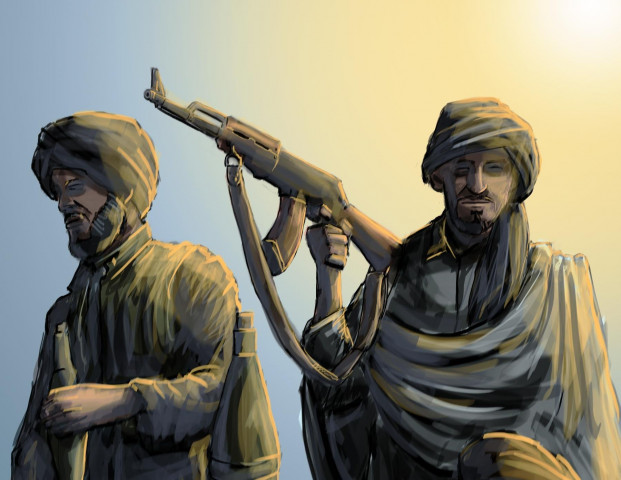Neighbourhood watch: Taliban defy Afghan govt, successfully conclude Iran visit
This was the second Taliban delegation to visit Iran in less than a week.

A Taliban official said the delegation addressed Iran’s concerns over the safety of Shias in Afghanistan. ILLUSTRATION: JAMAL KHURSHID/FILE
The delegation had been officially invited by the Iranian government and the visit stirred a heated debate in Afghanistan’s power corridors. The visit was kept a secret, completely bypassing the Afghan government.
The Afghan foreign ministry this week has sought details from the Iranian government as it opposes other countries directly contacting the Taliban. This was the second Taliban delegation that visited Iran in less than a week.
Afghan analysts have expressed skepticism over Iran’s intentions, with some terming it “alarming” and an attempt to “sabotage the peace process.”
The Afghan Taliban usually keep such visits clandestine, but acknowledged it this time after reports surfaced on the media.
“On an official invitation of the Islamic Republic of Iran, a delegation comprising a number of senior officials of the Islamic Emirate of Afghanistan once again visited Iran over the recent few days,” said Taliban spokesperson Qari Muhammad Yousaf a day after the delegation’s return. The Taliban label themselves as the Islamic Emirate, which was the country’s official name under their rule.
“Members of the Islamic Emirate voiced the demands of their people and the mujahidin to the representatives of different countries and briefed them about the current situation,” added Yousaf.
He did not disclose the names of the delegates, but Taliban sources told The Express Tribune the delegation was headed by Syed Tayyeb Agha, who previously led the team of Taliban negotiators in Qatar.
Other members from the Taliban’s Qatar office, including Maulvi Shahab-ud-Din Dilawar, Sher Muhammad Abbas Stanakzai and Qari Din Muhammad, were also part of the delegation.
Shortly before the recent visit, a three-member Taliban team had visited Iran to participate in the ‘Islamic Awakening Conference’ of international religious scholars in Tehran, said the Taliban spokesperson.
The Taliban have never been on good terms with Iran. Relations between them took a dip when 11 Iranian diplomats and a journalist were killed in the Afghan city of Mazar-e-Sharif in 1998 following an attack on the Iranian consulate as the Taliban took over the city.
Afghanistan’s Shia Hazara community also accused the Taliban of killing Shias in Bamiyan province during their rule.
The recent visit, however, has somewhat reduced the animosity between the Taliban and the Iranians. The Taliban have recognised Iran’s potential role in post-2014 Afghanistan while Iran is anxious to strengthen its influence following the Nato drawdown.
A Taliban official said the delegation addressed Iran’s concerns over the safety of Shias in Afghanistan.
“Taliban also requested Iranian officials not to support their political opponents or any other group as this had created misunderstandings between them in the past,” said the official, requesting anonymity.
Although the Iranian foreign ministry has been reluctant to officially confirm the visit, state news agency, Fars, which is thought to be close to the Iranian Revolutionary Guards, leaked the news the same day other media outlets reported the visit.
An Afghan journalist who reports on the Taliban said the insurgent group rarely confirms such visits, but “when they have some objectives, they quickly and intentionally acknowledge it.”
He did not give further details, however, but said the development comes amid speculations that the Taliban and the US may have re-established contact in Qatar for a possible resumption of their stalled dialogue.
The visit by the Qatar-based Taliban leaders shows their office, which is yet to be officially recognised by either the US or Afghanistan, does function as a platform for mediation and contact. Afghan officials had earlier stated their official position that the office should only be used for negotiations with the Afghan High Peace Council.
The trip may not be welcomed by the Afghan government because it is contrary to its strategy of the peace process being Afghan-led and negotiations be held in the country.
However, the Iran visit would not have been possible without America’s consent, as Qatar would never allow Taliban members to travel to Iran. The move also hints that the US might want to engage Iran in the Afghan peace process.
Published in The Express Tribune, June 8th, 2013.













COMMENTS
Comments are moderated and generally will be posted if they are on-topic and not abusive.
For more information, please see our Comments FAQ